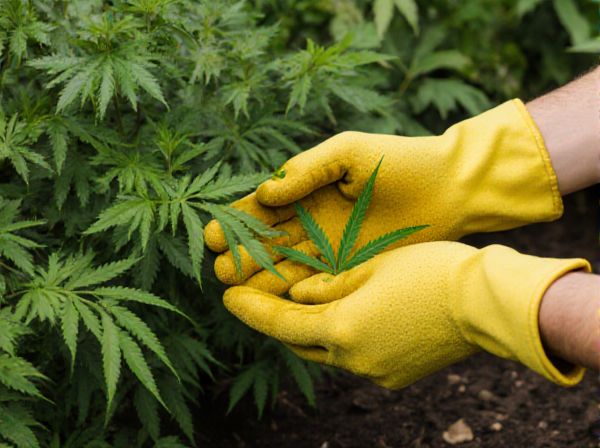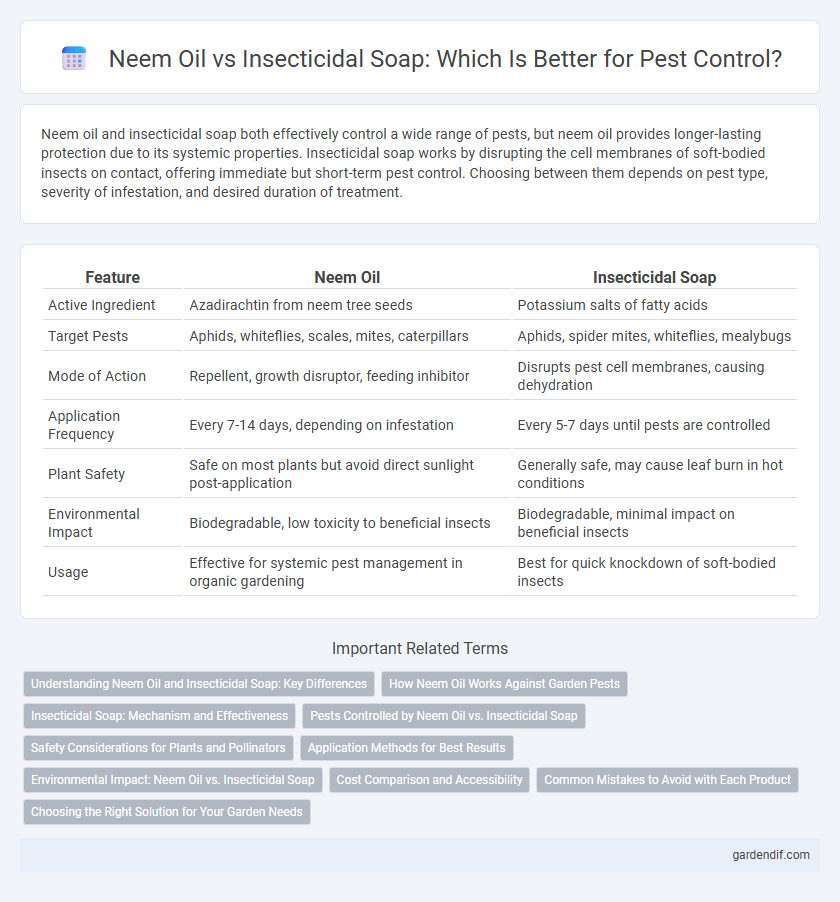
Neem oil vs Insecticidal soap Illustration
Neem oil and insecticidal soap both effectively control a wide range of pests, but neem oil provides longer-lasting protection due to its systemic properties. Insecticidal soap works by disrupting the cell membranes of soft-bodied insects on contact, offering immediate but short-term pest control. Choosing between them depends on pest type, severity of infestation, and desired duration of treatment.
Table of Comparison
| Feature | Neem Oil | Insecticidal Soap |
|---|---|---|
| Active Ingredient | Azadirachtin from neem tree seeds | Potassium salts of fatty acids |
| Target Pests | Aphids, whiteflies, scales, mites, caterpillars | Aphids, spider mites, whiteflies, mealybugs |
| Mode of Action | Repellent, growth disruptor, feeding inhibitor | Disrupts pest cell membranes, causing dehydration |
| Application Frequency | Every 7-14 days, depending on infestation | Every 5-7 days until pests are controlled |
| Plant Safety | Safe on most plants but avoid direct sunlight post-application | Generally safe, may cause leaf burn in hot conditions |
| Environmental Impact | Biodegradable, low toxicity to beneficial insects | Biodegradable, minimal impact on beneficial insects |
| Usage | Effective for systemic pest management in organic gardening | Best for quick knockdown of soft-bodied insects |
Understanding Neem Oil and Insecticidal Soap: Key Differences
Neem oil, derived from the neem tree seeds, contains azadirachtin which disrupts insect growth and feeding, making it effective against a broad range of pests such as aphids, whiteflies, and spider mites. Insecticidal soap, composed mainly of potassium salts of fatty acids, works by breaking down the insect's outer protective layer, causing dehydration and death primarily in soft-bodied insects like aphids and mealybugs. Neem oil also offers antifungal properties and longer residual effects, whereas insecticidal soap provides rapid knockdown with minimal residual impact.
How Neem Oil Works Against Garden Pests
Neem oil acts as a potent natural pesticide by disrupting the hormonal systems of garden pests, inhibiting their feeding, growth, and reproduction. Its active compound, azadirachtin, interferes with insect molting and deters eggs from hatching, effectively reducing pest populations over time. Unlike insecticidal soap that kills on contact by dissolving insect exoskeletons, neem oil provides longer-lasting protection by targeting multiple life stages of harmful insects.
Insecticidal Soap: Mechanism and Effectiveness
Insecticidal soap works by penetrating and disrupting the cell membranes of soft-bodied pests like aphids, whiteflies, and spider mites, causing dehydration and death. Its effectiveness is enhanced by direct contact, making thorough coverage essential for pest control. Unlike neem oil, insecticidal soap is primarily a contact insecticide with minimal residual activity, which reduces harm to beneficial insects and plants.
Pests Controlled by Neem Oil vs. Insecticidal Soap
Neem oil effectively targets a broad range of pests including aphids, whiteflies, spider mites, and caterpillars by disrupting their hormonal systems and preventing feeding. Insecticidal soap primarily controls soft-bodied insects like aphids, mealybugs, and spider mites by breaking down their protective outer layers, causing dehydration. Both are eco-friendly options, but neem oil offers a more systemic action against pests compared to the contact-only effect of insecticidal soap.
Safety Considerations for Plants and Pollinators
Neem oil is a natural insecticide derived from Azadirachta indica seeds, offering effective pest control with minimal toxicity to beneficial pollinators such as bees and butterflies when used as directed. Insecticidal soap, composed of potassium salts of fatty acids, provides targeted pest management by disrupting insect cell membranes but can cause phytotoxicity if applied in high concentrations or under direct sunlight, potentially harming sensitive plants. Both treatments require careful consideration of application timing and concentration to maximize plant safety and protect pollinator health while managing pest populations.
Application Methods for Best Results
Neem oil absorbs directly into the insect's system when sprayed on foliage, requiring thorough coverage for effective pest control. Insecticidal soap works by breaking down the pest's outer membrane upon contact, best applied during early morning or late evening to minimize phytotoxicity. Both treatments benefit from repeated applications every 7-10 days to manage pest populations effectively.
Environmental Impact: Neem Oil vs. Insecticidal Soap
Neem oil is derived from the neem tree and is biodegradable, posing minimal risk to beneficial insects, aquatic life, and soil health, making it an environmentally friendly option for pest control. Insecticidal soap, made from potassium salts of fatty acids, breaks down quickly without leaving harmful residues but may harm soft-bodied beneficial insects on contact. Both products offer eco-friendly pest management, but neem oil's selective toxicity and longer residual activity generally result in a lower overall environmental impact.
Cost Comparison and Accessibility
Neem oil typically costs more than insecticidal soap but offers longer-lasting pest control due to its systemic effects. Insecticidal soap is widely available at garden centers and hardware stores, often making it a more accessible and budget-friendly option for casual gardeners. Both products vary in application frequency and effectiveness, influencing their overall cost-efficiency depending on pest severity and garden size.
Common Mistakes to Avoid with Each Product
When using neem oil, avoid applying it in direct sunlight or on stressed plants, as this can cause leaf burn and reduce effectiveness. Insecticidal soap must be thoroughly sprayed on all plant surfaces to control pests, but overapplication can harm sensitive plants and beneficial insects. Both products require consistent reapplication and careful timing to prevent pest resistance and damage to your garden ecosystem.
Choosing the Right Solution for Your Garden Needs
Neem oil and insecticidal soap serve distinct roles in pest management: neem oil acts as both a pesticide and fungicide by disrupting insect growth and feeding, while insecticidal soap targets soft-bodied insects through direct contact and desiccation. For gardens with persistent pests like aphids, whiteflies, or mites, neem oil offers longer-lasting protection and soil health benefits. In contrast, insecticidal soap is ideal for rapid knockdown of localized infestations with minimal residual impact on beneficial insects.
Neem oil vs Insecticidal soap Infographic

 gardendif.com
gardendif.com